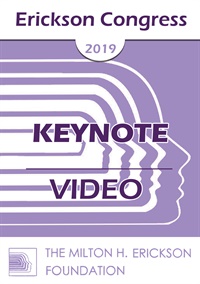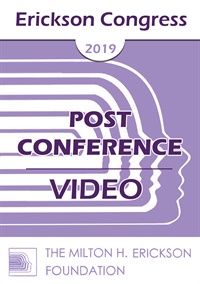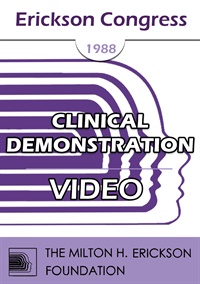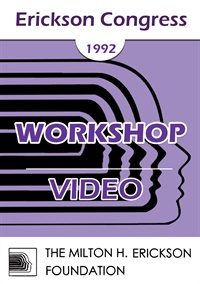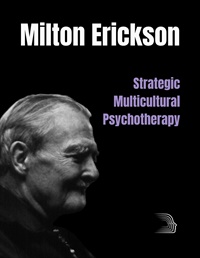- Average Rating:
- Not yet rated
- Topic Areas:
- Keynotes | Ericksonian Hypnosis and Therapy Techniques | History of Psychotherapy | Metaphors | Utilization | Experiential Therapy | Unconscious Processes
- Categories:
- Erickson Congress | Erickson Congress 2019
- Faculty:
- Stephen Lankton, MSW
- Course Levels:
- Master Degree or Higher in Health-Related Field
- Duration:
- 54 Minutes
- Format:
- Audio and Video
- Original Program Date:
- Dec 12, 2019
- Short Description:
- Dr. Milton Erickson graduated from the University of Wisconsin’s School of Medicine in 1925. During the ensuing 55 years of his career, Erickson was devoted to researching, practicing, learning, refining, teaching, and publishing the lessons borne of his creative intuition and experience. And over the years his practices evolved. The last two decades of his life, and even more so in the 40 years since his death, through the efforts of those he influenced the number of ideas and interventions attributed to Erickson proliferated abundantly.
- Price:
-
Sale is $29.00
price reduced from Base Price - $59.00
- Average Rating:
- Not yet rated
- Topic Areas:
- Master Classes | Ericksonian Psychotherapy | Psychotherapy | Brief Therapy | Hypnotherapy | Self-Relations | Utilization
- Categories:
- Erickson Congress | Erickson Congress 2019
- Faculty:
- Bill O'Hanlon, MS | Jeffrey Zeig, PhD
- Course Levels:
- Master Degree or Higher in Health-Related Field
- Duration:
- 4 Hours 49 Minutes
- Format:
- Audio and Video
- Original Program Date:
- Dec 16, 2019
- Short Description:
- Ericksonian hypnotherapy and the Self-Relations approach are experiential methods of change. In combination they can be synergistic. Psychotherapy is best when clients have a first-hand experience of an alive therapeutic process. Such dynamic empowering experiences pave the way for dynamic understandings. Bill O’Hanlon and Jeffrey Zeig will engage with each other and the participants to examine commonalities and differences in their work.
- Price:
- $59.00 - Base Price
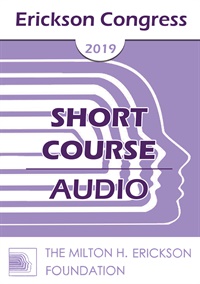
- Average Rating:
- Not yet rated
- Topic Areas:
- Short Courses | Utilization | Psychotherapy | Ericksonian Hypnosis and Therapy Techniques | Hypnosis | Genomics | Cancer
- Categories:
- Erickson Congress | Erickson Congress 2019
- Faculty:
- Mauro Cozzolino, PhD | Giovanna Celia, PhD
- Duration:
- 1 Hour 26 Minutes
- Format:
- Audio Only
- Original Program Date:
- Dec 12, 2019
- Short Description:
- In this course, we are going to illustrate how Erickson’s classic Utilization principle can be translated into chrono-bio-genomic terms. For a long time now, we have known that this principle lies at the basis of Erickson’s amazing ability to facilitate the natural self-healing, growth and evolution processes that every patient possesses inside. To date, only few therapists have integrated the chro-bio-genomic dimensions that are inherent in the Utilization principle, in their clinical practice.
- Price:
- $15.00 - Base Price
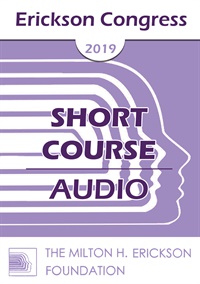
- Average Rating:
- Not yet rated
- Topic Areas:
- Short Courses | Utilization | Trauma | Ericksonian Hypnosis and Therapy Techniques
- Categories:
- Erickson Congress | Erickson Congress 2019
- Faculty:
- Stefanie Badenhorst, D Litt
- Duration:
- 1 Hour 28 Minutes
- Format:
- Audio Only
- Original Program Date:
- Dec 12, 2019
- Short Description:
- It has become increasingly documented that the vast majority of patients with adult pathology, reported experiences of severe childhood trauma. Early appropriate therapeutic intervention can relieve symptoms and prevent adjustment difficulties and pathology. A theoretical overview of the effect of trauma will explain the process of dissociation as a coping mechanism to deal with overwhelming experiences. The child dissociates from feelings and memories associated with trauma in order to survive emotionally. The dissociation is initially helpful and enables the individual to cope, however eventually it can result in pathology and become destructive.
- Price:
- $15.00 - Base Price

- Average Rating:
- Not yet rated
- Topic Areas:
- Topical Panels | Utilization | Ericksonian Hypnosis and Therapy Techniques
- Categories:
- Erickson Congress | Erickson Congress 2019
- Faculty:
- Tamer Dovucu, MA | Krzysztof Klajs, Dipl. Psych | Michael Munion, MA, LPC | Bernhard Trenkle, Dipl. Psych
- Duration:
- 1 Hour 1 Minutes
- Format:
- Audio Only
- Original Program Date:
- Dec 13, 2019
- Short Description:
- Utilization is a state of response readiness in which the clinician stands ready to utilize whatever exists in therapeutic situation to advance clinical goals.
- Price:
- $15.00 - Base Price
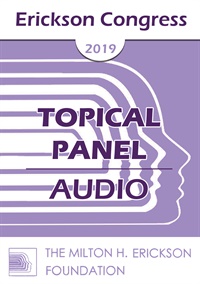
- Average Rating:
- Not yet rated
- Topic Areas:
- Workshops | Ericksonian Hypnosis and Therapy Techniques | Resistance | Suicide | Utilization
- Categories:
- Erickson Congress | Erickson Congress 2019
- Faculty:
- Eric Greenleaf, PhD
- Duration:
- 1 Hour 54 Minutes
- Format:
- Audio Only
- Original Program Date:
- Dec 12, 2019
- Short Description:
- Utilization of Dr. Erickson's approaches can be daunting. They are both meticulously planned and rehearsed, as with his Induction for Resistant Patients, and spontaneous and intuitive, responding at the moment to his patient. Dr. Greenleaf will present 7 of his own brief cases, each of which required spontaneous, intuitive response to patient needs. They are called: 2 Promises: Postcards, Death Grip; 2 Threats: Bust, “I Like That Wall”; 2 Doorways to Reality: “You Wonned”, “I’d Like to Have That Desk” and "3 Counter Tenors"
- Price:
- $15.00 - Base Price
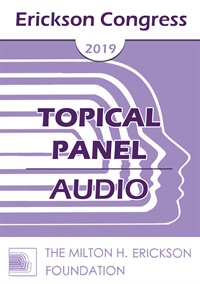
- Average Rating:
- Not yet rated
- Topic Areas:
- Workshops | Hypnotherapy | Indirection | Utilization | Ericksonian Hypnosis and Therapy Techniques
- Categories:
- Erickson Congress | Erickson Congress 2019
- Faculty:
- Gunther Schmidt, MD, MA
- Duration:
- 1 Hour 57 Minutes
- Format:
- Audio Only
- Original Program Date:
- Dec 12, 2019
- Short Description:
- Transparent hypnotherapy instead of indirectness- how clients as active co-hypnotherapist with all their senses can be invited to utilize symptoms as competent messengers of needs. In the Ericksonian tradition on the one side it is assumed that the knowledge and competences are already existent within the clients but on the other side many hypnotherapeutic interventions are structured as rather indirect and intransparent for the conscious mind of the clients.
- Price:
- $15.00 - Base Price
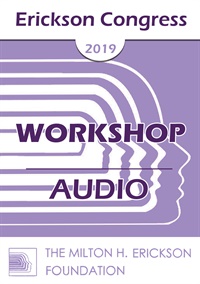
- Average Rating:
- Not yet rated
- Topic Areas:
- Workshops | Hypnosis | Psychotherapy | Storytelling | Utilization
- Categories:
- Erickson Congress | Erickson Congress 2019
- Faculty:
- Marc Oster, PsyD
- Duration:
- 1 Hour 58 Minutes
- Format:
- Audio Only
- Original Program Date:
- Dec 13, 2019
- Short Description:
- Mr. Miyagi (The Karate Kid, 1984) taught his student, Daniel many things. Among them, things are not always as they seem and about functionality. Simple day-to-day activities can also be karate moves, which Daniel wanted to learn. Milton Erickson, a Western version of Mr. Miyagi, introduced us to his concept of utilization in psychotherapy, or functionality. So important was this discovery that the concept of utilization is now a part of virtually every form of talk therapy and healthcare fields in general; it is now common sense.
- Price:
- $15.00 - Base Price
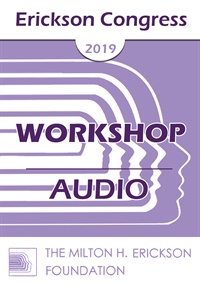
- Average Rating:
- Not yet rated
- Topic Areas:
- Workshops | Utilization | Neuroscience | Ericksonian Hypnosis and Therapy Techniques | Hypnotic Induction | Resources
- Categories:
- Erickson Congress | Erickson Congress 2019
- Faculty:
- Jeffrey Feldman, PhD
- Duration:
- 1 Hour 45 Minutes
- Format:
- Audio Only
- Original Program Date:
- Dec 13, 2019
- Short Description:
- This primarily experiential workshop will guide participants through two related hand focusing hypnotic induction techniques that utilize both Western and Eastern concepts of energy balance. This will include Western concepts of nerve conduction, hemispheric functional differences, cybernetics, resonance, coherence and entrainment, with Eastern concepts of polarities and the unblocking, flow and balance of energy (Chi, Prana).
- Price:
- $15.00 - Base Price
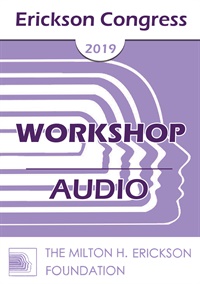
- Average Rating:
- Not yet rated
- Topic Areas:
- Workshops | Naturalistic | Ericksonian Hypnosis and Therapy Techniques | Utilization
- Categories:
- Erickson Congress | Erickson Congress 2019
- Faculty:
- Helen Erickson, PhD, MSN, AHN-BC, FAAN, SGAHN
- Duration:
- 1 Hour 57 Minutes
- Format:
- Audio Only
- Original Program Date:
- Dec 15, 2019
- Short Description:
- People have holistic, mind-body-brain interactions, an inherent predisposition to grow, individuate and actualize their potential. But sometimes people get stuck due to their concurrent need for human affiliations. A sense of unresolved loss between the two effects their ability to develop a healthy balance of affiliated-individuation which is needed to negotiate the multiple epigenetic developmental tasks from birth to death.
- Price:
- $15.00 - Base Price
- Average Rating:
- Not yet rated
- Topic Areas:
- Clinical Demonstrations | Utilization | Hypnotherapy
- Categories:
- Erickson Congress 1988 | Erickson Congress
- Faculty:
- Jeffrey Zeig, PhD
- Course Levels:
- Master Degree or Higher in Health-Related Field
- Duration:
- 48:52
- Format:
- Audio and Video
- Original Program Date:
- Dec 09, 1988
- Short Description:
- IC88 Clinical Demonstration 01 - The Utilization Approach to Hypnotherapy - Jeffrey K. Zeig, PhD
- Price:
- $29.00 - Base Price
Tags: Hypnotherapy Utilization
- Average Rating:
- Not yet rated
- Topic Areas:
- Workshops | Hypnotherapy | Utilization
- Categories:
- Erickson Congress | Erickson Congress 1992
- Faculty:
- Eric Greenleaf, PhD
- Course Levels:
- Master Degree or Higher in Health-Related Field
- Duration:
- 57:08
- Format:
- Audio and Video
- Original Program Date:
- Dec 05, 1992
- Short Description:
- IC92 Workshop 69b - Demonstrations V - The Utilization of Symptom Sequences in Hypnotherapy - Eric Greenleaf, Ph.D.
- Price:
-
Sale is $29.00
price reduced from Base Price - $59.00
Tags: Hypnotherapy Utilization
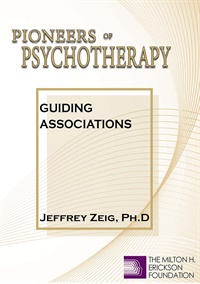
- Average Rating:
- Not yet rated
- Topic Areas:
- Clinical Demonstrations | Ericksonian Hypnosis and Therapy Techniques | Ericksonian Psychotherapy | Utilization | Humor | Hypnosis | Psychotherapy
- Bundle(s):
- Pioneers of Psychotherapy Bundle
- Categories:
- Pioneers of Psychotherapy | Evolution of Psychotherapy | Evolution of Psychotherapy 1995
- Faculty:
- Jeffrey Zeig, PhD
- Course Levels:
- Master Degree or Higher in Health-Related Field
- Duration:
- 00:57:00
- Format:
- Audio and Video
- Original Program Date:
- Dec 14, 1995
- Short Description:
- Zeig (1995) demonstrates the Ericksonian approach to psychotherapy while working with Carol, a woman whose nail-biting habit is rooted in anxiety. After gathering information on her personal history, Zeig helps Carol utilize her values and history to affect change. The process is both humorous and dramatic. After working to change associations linked to the problem behavior, Zeig offers Carol an ordeal that will produce a "guaranteed cure." Hypnosis is offered as the "dessert", rather than the main course. Ericksonian approach to psychotherapy.
- Price:
- $59.00 - Base Price
- Average Rating:
- Not yet rated
- Topic Areas:
- Milton Erickson | Multicultural | Psychotherapy | Ericksonian Hypnosis and Therapy Techniques | Utilization | Hypnosis | Strategic Therapy
- Categories:
- Erickson Streaming Video Collection | Erickson Materials | Milton H. Erickson Collections
- Faculty:
- Jeffrey Zeig, PhD | Milton H. Erickson, MD
- Course Levels:
- Master Degree or Higher in Health-Related Field
- Duration:
- 59 Minutes
- Format:
- Audio and Video
- Original Program Date:
- Aug 13, 2020
- Short Description:
- Milton Erickson often advised psychotherapy students to study anthropology so that therapy could be provided from the perspective of the cultural background of the client. In the video, Erickson uses his understanding of cultural orientation when working with an adolescent where the presenting problem is a speech defect. This is a highly informative case of using strategic and systemic processes that can be applied to other presenting problems.
- Price:
- $19.95 - Base Price
- Average Rating:
- Not yet rated
- Topic Areas:
- Milton Erickson | Arm Levitation | Ericksonian Hypnosis and Therapy Techniques | Hypnosis | Trance | Utilization | Hypnotic Phenomena
- Bundle(s):
- Spanish Erickson Video Bundle
- Categories:
- Erickson Materials | Erickson Streaming Video Collection | Milton H. Erickson Collections | Spanish | World Languages
- Faculty:
- Milton H. Erickson, MD | Jeffrey Zeig, PhD
- Course Levels:
- Master Degree or Higher in Health-Related Field
- Duration:
- 1 Hour 19 Minutes
- Format:
- Audio and Video
- Original Program Date:
- May 07, 2020
- Short Description:
- En la segunda parte de un seminario de enseñanza con Milton Erickson, será testigo de cómo Erickson observó y utilizó cuidadosamente los comportamientos no verbales de un estudiante para desarrollar una experiencia de trance utilizando la levitación del brazo mientras interactúa simultáneamente para enseñar a otros estudiantes. Verá cómo el Dr. Erickson utilizó estratégicamente los fenómenos hipnóticos.
- Price:
- $29.95 - Base Price


